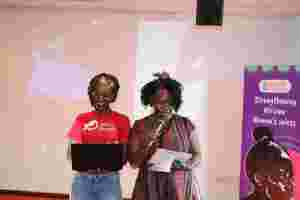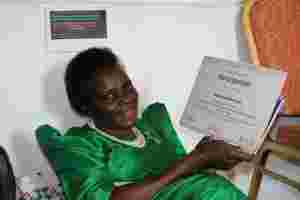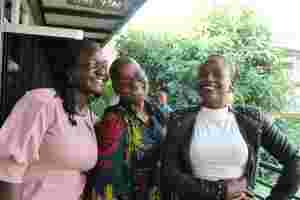Abiding by our mission to develop a cadre of feminist leaders through our flagship program the African Women’s Leadership Institute (AWLI), with support from UN Women Uganda, we successfully concluded a 7-week virtual Feminist and Transformational Leadership Fellowship from the 28th of July to the 15th of September, 2020.
The ceremony held on 3rd November at Kabira Country Club in Kampala, was held both physically and virtually, climaxed by the awarding of certificates, in a true celebration of the 30 women who braved the seven weeks of hard work.
Hope Chigudu, a feminist activist, and organizational development expert gave the key note at the commencement, emphasizing the importance of self-development and encouraged participants to set clear targets that their mentors and fellow mentees would hold them accountable for. She also encouraged them not to underestimate their potential on the basis of age.
“Don’t get stuck in ageism. If you continue thinking you are young, you may never achieve much. Use your energy and the opportunity you have now to create and look out for what you can do for the world,” she said.

Oliver Aol, one of the participants who travelled all the way from Nwoya district, in northern Uganda, while sharing her learnings from the programme said “I now have the knowledge to continue doing what I was doing, even better. Imagine I was running a community based organisation supporting women, but did not have the full understanding about how to communicate women’s issues and their rights. I will use the knowledge I have received to make a difference starting with my community and family”.
To support the personal and professional leadership development of the fellows, each of the participants will be attached to a feminist mentor for one year to guide them on their community action plans.

See the profiles of the mentors here
Eunice Musiime, AMwA’s Executive Director, who also doubles as a mentor, encouraged the participants to sustain and strengthen the mentorship relationship through regular and deliberate meetings. She addressed the issue of unequal power relations, reminding the mentors to use their privilege for, and not against their mentees, by exposing them to their strategic networks. Highlighting the importance of transparency, she asked mentors to identify ways of addressing issues and be accountable to each other.
Organized under the theme, ‘Civic Leadership and Governance: Amplifying Young Women’s Voices in Decision-Making Processes’, the training supported 30 young women to receive a powerful and holistic feminist grounding to define, analyze and articulate their experiences of inequalities and devise solutions for sustained change in governance, civic and political spaces.
Due to the changes ushered in by the Covid-19 pandemic, we adjusted our mode of facilitation, incorporating digital methodologies like live sessions, self-paced learning, and peer to peer group sessions conducted via digital tools; Zoom and WhatsApp.
The fellowship commenced with a virtual Opening Ceremony on 28th July 2020, inaugurated by Adekemi Ndieli, the Deputy Country Representative for UN Women Uganda. It was attended by the participants, UN Women representatives, AWLI faculty and alumnae, and AMwA staff.
In her remarks, Adekemi Ndieli, who was the chief guest, noted that the full participation of women in leadership and decision making is essential to building and sustaining vibrant democracies, commending AMwA for her decision to launch the fellowship virtually rather than wait for the pandemic to end.
She emphasized the urgent need for spaces where young women can be empowered and equipped with leadership skills noting that “young people are the leaders of today. However, they are made and crafted and the AWLI is a platform where this can happen”.

The training covered modules on personal development, feminist theory and leadership, organising skills and taking action; covering topics on understanding power and Patriarchy, women’s rights, leading social transformation and feminist advocacy and Movement Building; just to mention.
The Personal Development module facilitated by Ms. Chigudu, showcased the link between feminist leadership and commitment to self-care as an overall maintenance practice.
“Creating boundaries is not rejecting people, unloving them or being hard on them, it is saying that I love you but I need energy to be able to manage this world,” she said, urging participants to create healthy emotional boundaries and remain emotionally grounded.
Dr. Eunice Adubango, a thriving entrepreneur, took the participants through the innovation and creativity session focused on the processes of business development from ideation, incubation and finally production.
Participants during the feminist theory module, analyzed power and privilege as tools of patriarchal oppression, unpacking gender roles, and discussing the systemic nature of patriarchy, under the guidance of Tricia Twasiima, AMwA’s Women’s Economic Justice Lead.
She tasked participants to reflect and recognize their own privilege in relation to sexuality, pay, education levels, family background, and use it to advance feminist ideals. This and the self-paced sessions resulted in participants being able to link the everyday injustices suffered by women as the system of oppression that is patriarchy.

“Feminism means transforming power relations and the end goal of it all is the freedom for all women.” –Tricia Twasiima-
The women’s rights session familiarized participants with women’s human rights and provided an overview of women’s rights in Uganda, underscoring the historical struggle of women to enjoy their rights. Through a participatory process, they discussed their intentions of being women’s rights activists and were educated on international human rights instruments pertaining to women. The Feminist Advocacy and Movement building session enhanced the participant’s capacity for advocacy by imparting practical skills and facilitated a common understanding of the social movements in Uganda and the world.
Transformation starts from within, you cannot change others before you change yourself. – Hope Chigudu